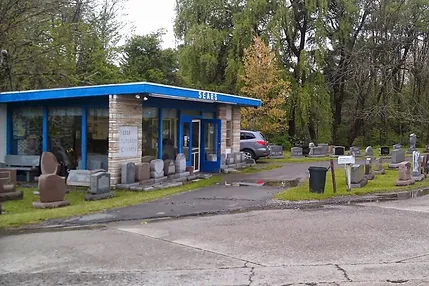West Virginia’s economic development, workforce and education leaders are focused on getting skilled laborers for the technological and industrial jobs pouring into the state.
But what about the many small businesses that need workers for simpler, hands-on jobs?
As we end our series “Help Wanted, Understanding West Virginia’s Labor Force,” Randy Yohe speaks with small business owner Brent Sears, who has a rebuttal after hearing our story on the job-seeking services the state’s prime workforce agency provides.
“There are people out there that need work. I don’t know how to find them. And I’m not having much luck with Workforce,” Sears said.
For 112 years, the Sears Monument Company has served funeral homes and cemeteries throughout West Virginia. Sears’ grandfather started the business, and they now have offices in Charleston, Huntington and Beckley. He said they try to hire people to do the basic cemetery monument industry’s job.
“They engrave our granite that we sell to people, we order and size and finish to the family specifications,” Sears said. “Then we actually add the names, sandblast the names in, and do the carving work. And then we load the monuments onto our trucks and take them to the cemetery and install them with a concrete foundation below them.”
Sears said he took exception when he heard WVPB’s interview with acting commissioner of WorkForce West Virginia Scott Adkins about ways the agency tries to connect workers and employers.
On the agency’s website it reads:
“The agency has a network of workforce development services to provide citizens and employers the opportunity to compete in today’s global economy.”
In the interview, Adkins described what WorkForce West Virginia does to fill positions for businesses, industries and corporations coming to West Virginia.
“We help employers recruit qualified applicants,” Adkins said. “Virtual job fairs, on-site job fairs, we do upscaling retraining, we work with the Higher Education Policy Commission, DHHR, a bunch of different partners at the state level, to make sure we’re finding the right people for the right job.”
Sears said for years now, WorkForce West Virginia’s focus on virtual job fairs and upscale retraining has failed to help get him his needed $12 an hour, laborers.
“Most of the people that I’m trying to hire may or may not have cell phones, may or may not have computers,” he said. “They can’t do the virtual things that the workforce is trying to get everybody to do. It used to be that we would send in our job, and then they would send us people. But in the last five years and even worse, or currently in the last two years, it just doesn’t happen.”
Adkins explained how his agency gauged success.
“We take somebody who is unemployed or underemployed and put them in a position where they can succeed,” Adkins said. “At the same time, meeting whatever need that employer has, which is critical.”
Sears said, in his interactions with WorkForce West Virginia, his company’s labor needs are not being met.
“I need people that can use a shovel and a wheelbarrow, and can pull heavy loads up steep hills with another person, and the use of equipment like dollies, and cranes,” Sears said. “It’s hard work. But it’s constant work. I’m not the only employer out there trying to find employees. I did talk to other business people in the community, and it’s rampant everywhere.”
Adkins said the state has tried to create a sort of self-service, one-stop job seeking operation across all state agencies.
Sears said he knows there are people out there that can work that are not actively seeking a job, and he needs the state to do more to get them employed, and his business thriving again.
——
This story is part of the series, “Help Wanted: Understanding West Virginia’s Labor Force.”
